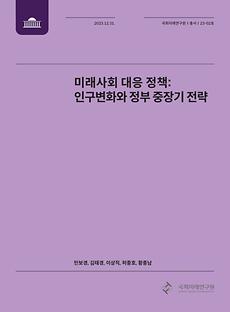
Previously unexperienced demographic changes, such as population decline and rapid aging, are presenting new challenges for South Korea. Are we adequately prepared for the future amid these rapid changes? Is the government effectively addressing these issues from a medium to long-term perspective? This study aims to examine the government's medium to long-term strategy related to population changes and derive insights by investigating policies related to elderly health, defense personnel, immigration, and regional policies for population decline.
In examining the policies for an aging society and elderly health, the study finds that national-level medium to long-term plans provide fundamental policy directions for establishing a healthy and humane aging society and can be linked to indicators for future society response. Looking into population decline and defense personnel policies, the study observes that the basic defense reform plan can be influenced by changes in administration and the target of maintaining a standby military force size of 500,000 in the mid-term defense plan is practically challenging to achieve.
Regarding population decline and immigration policies, a significant portion of the budget is being used for multicultural family support, while policy considerations for foreign laborers and other related aspects have been inadequate. An examination of regional policies for population decline reveals that they primarily focus on economic aspects in responding to population decline, highlighting the need for a more multifaceted strategy.
While it is possible to link the government's medium to long-term strategies through a framework of indicators for future society response, it is also necessary to establish a more detailed and multi-dimensional framework for evaluating government policies. From the perspective of long-term future readiness, it is essential to strengthen the government's planning and systematic approach in allocating budgets related to population changes, such as population decline and aging. Furthermore, establishing a mechanism for monitoring the national medium to long-term strategy at the legislative level is required.